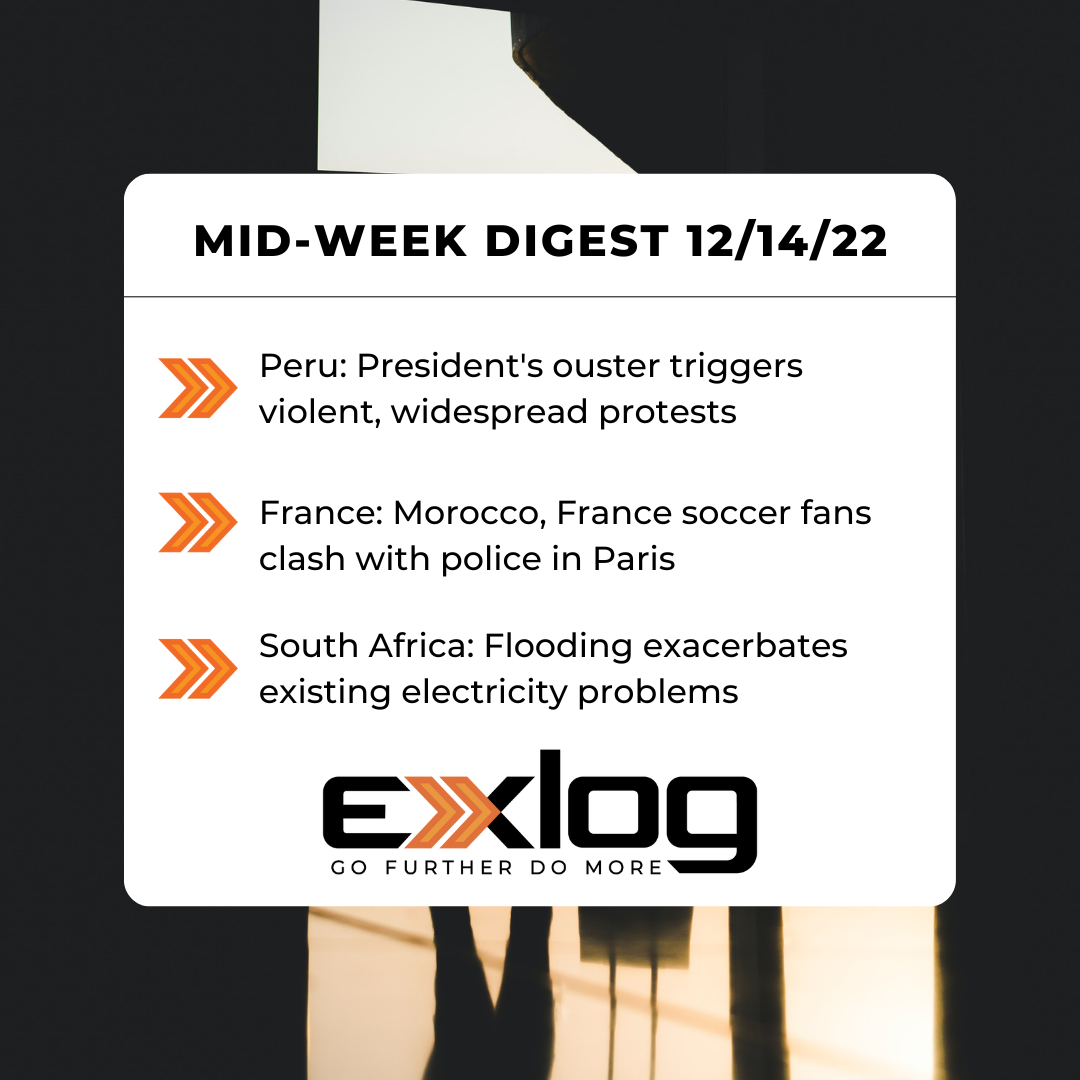President’s ouster triggers violent, widespread protests in Peru; Soccer fans clash with police in Paris and flooding exacerbates electricity problems in South Africa
Peru: President’s ouster triggers violent, widespread protests
A week of violent protests following the ousting and detention of Peruvian President Pedro Castillo – resulting in casualties, looting, and widespread travel disruptions – has led the government to declare a nationwide state of emergency on Dec. 14. Pro-Castillo demonstrators have clashed with security forces in Lima and several other cities and erected roadblocks on highways in at least 14 provinces, including on the Pan-American highway, a major food supply route to the capital. As of Dec. 14, at least seven people died and nearly 170 others sustained injuries in protests across the Apurímac, Lima, Huancavelica, and Arequipa regions. Many domestic and international flights, as well as inter-provincial bus routes, have been suspended, affecting nearly one million passengers. In addition to blocking key routes, attacking police stations, and vandalizing airports, protesters also stormed and damaged metro stations in Lima and several private businesses in other parts of the country, including domestic and foreign business facilities, a TV station, and a gas compression plant. Protests first erupted after President Castillo temporarily dissolved the Peruvian Congress on Dec. 7 to avoid an impeachment hearing, imposing a 2200-0400 curfew and calling for legislative elections within nine months. The National Assembly declared Castillo’s actions unconstitutional and swore in Vice President Dina Boluarte, who deployed riot police and declared a nationwide state of emergency amid ongoing anti-government protests. In an attempt to quell the unrest, acting President Boluarte announced on Dec. 14 that elections could be held in December 2023 – instead of the originally proposed date of April 2024. At the time of the publication, it remains unclear if Boluarte’s announcement is sufficient to subdue the rallies; roadblocks remained in place as of early Dec. 14. Prolonged unrest and associated travel interruptions will significantly alter the operational environment in the country and will likely lead to supply chain and business continuity disruptions and shortages of goods.
France: Morocco, France soccer fans clash with police in Paris
Clashes between soccer fans and police in Paris following Morocco and France’s quarter-final wins in the FIFA World Cup on Dec. 10 resulted in casualties, arrests, and private property damage. Media reports state that over 20,000 fans gathered on the Champs-Élysées to celebrate France’s 2-1 victory over England and Morocco’s 1-0 win over Portugal. In preparation for the marches, Parisian authorities mobilized more than 1,200 riot police to patrol the Champs-Élysées sector and closed down several important Parisian access gates, including Porte de la Muette, Porte Maillot, Porte des Ternes and Porte Dauphine. While the celebration was initially peaceful, it escalated to violence when fans discharged fireworks and other projectiles at police, vandalized numerous shops, and set fire to motorcycles on the Avenue de Friedland; officers responded with tear gas and batons. Riots following Morocco’s win were not isolated to Paris – thousands of Moroccan supporters also took to the streets in London, Milan, and Belgium, triggering significant travel disruptions. Unrest following matches has become a trend as Morocco has advanced in the World Cup. In late November, Moroccan fans rioted in Brussels following their victory over the Belgian national team, vandalizing cars and local shops and clashing with local police. Violence surrounding soccer matches – especially during major tournaments – is a long-running issue in France. Nine different Ligue One matches experienced acts of aggression from fans in the 2021 season, with incidents ranging from bottle throwing to an ambush of a bus carrying Bordeaux fans in Montpelier, which injured 16 people. In preparation for the FIFA World Cup semi-finals between France and Morocco that are scheduled for 1900 GMT (1400 EST) on Dec. 16, French authorities have mobilized 10,000 police officers across the country, with approximately 7,500 security personnel dedicated to the Ile-de-France region and the capital. Additional clashes between rival groups of fans are expected in Paris and other European cities with large Moroccan populations following the match and will likely result in disruptions to travel and business operations, as well as vandalism and property damage.
South Africa: Flooding exacerbates existing electricity problems
Further infrastructure and private property damage is expected in Gauteng and other South African provinces as heavy rains and subsequent flooding continue to batter the country. The province of Gauteng, particularly Johannesburg and its outskirts, has experienced heavy rainfall and flooding since Dec. 8, which have resulted in severe travel infrastructure damage, suspension of public transportation services, and interruption of water supplies. Johannesburg’s Emergency Services have struggled to access critical infrastructure due to flooding and have warned people living in low-lying areas to evacuate to higher ground in anticipation of storms forecasted for the coming days. The recent storms and flooding have also damaged electrical infrastructure, which was already poorly maintained and prone to breakdowns. Since Dec. 9, residents of Gauteng have experienced either a complete loss of power or rolling blackouts – with outage durations only projected to increase in the near term. Damaged poles and cables have been exposed during the floods, and many transformers and substations remain underwater, causing one substation to explode. As of Dec. 13, several areas in Johannesburg remained without power as local utility company City Power works to address 4,000 outage calls. Despite deploying all available technicians to restore services, much of the infrastructure will remain inaccessible until flood waters recede. Even in areas where infrastructure can be accessed, vandalism of power supply infrastructure and acts of violence have hampered efforts to restore service. The South African Weather Service (SAWS) has forecast a 60% chance of showers, thunderstorms, and associated flooding in Gauteng and other provinces – including Limpopo, KwaZulu-Natal, and Western Cape – at least until Dec. 17, indicating a high likelihood of additional damage to private property and civilian infrastructure.


